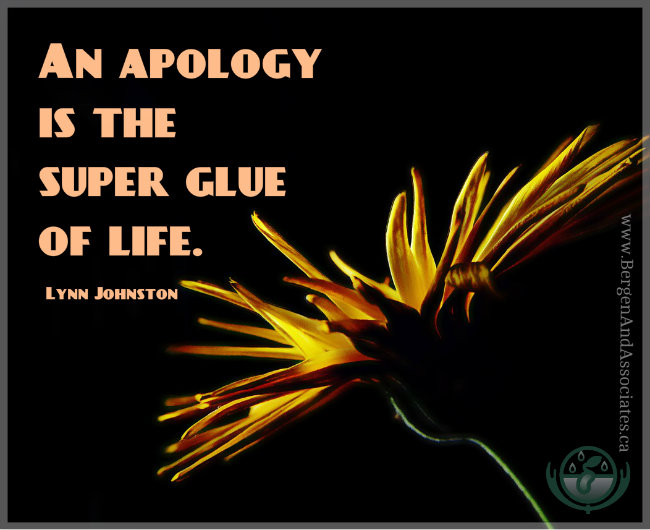The first of a series on apologies and forgiveness…
Even when it is totally obvious that s/he has messed up, my mother/husband/friend/child has huge trouble apologizing. It drives me crazy. Why is it so hard to apologize?
Apologizing is hard. Absolutely.
Apologizing takes courage, because it puts a person in a vulnerable space to apologize. It is opening yourself up to the possibility of criticism and lecture, of blame and anger.
It is humbling to apologize…and in our culture, humility isn’t always a prized value.
There is one important thing to remember that makes apologizing a great deal more possible: Remember that you are apologizing for something you did, not for who you are.
That sounds really basic, and maybe even obvious, but it often doesn’t feel that way. The hard part about apologizing is that it can feel like a person is, in essence, saying that they are a loser/screwed-up.
If apologizing means that you are saying you are a screw-up, then apologizing simply isn’t possible. It becomes a soul destroying thing to acknowledge to another.
An apology doesn’t make you a lesser person. It makes you a bigger person…it means putting your brave on and owning something in a way that garners respect from others.
What are the components of a good apology?
There are several basic components of a good apology:
- Own it. Let the other know that you take responsibility. Great lines are: I goofed, I made a mistake, I need to apology for how I blew it. It doesn’t mean you are saying you are a terrible person, it means you are acknowledging that you did something out of alignment with who you want to be.
- Keep it simple and real. Short is better than long…don’t try to talk your way out of it, rationalize or become defensive. Authenticity is huge–let the other person see how you have been affected.
- Make the other person’s perspective important and clear. Use empathy. Demonstrate an understanding for the impact on the other–this would suggest more than “I understand”. Something like: “When I didn’t show up for lunch that day, you would have felt your time was being wasted, and you probably felt hurt that I was disrespectful to you as a friend.” Have them be seen in your words.
- Work to make it right. This might be done by letting the other know how you will handle it next time: “I will be certain to let you know well in advance if something else comes up.” or perhaps by making restitution: “The next lunch is on me as an expression of my apology.” You might want to check with the other to know what s/he needs from you to make it feel right for them.
I apologized, but the other person hasn’t forgiven me. What can I do?
Apologizing and receiving forgiveness are two separate entities. You may be sincerely regretful of your actions, but the other person may not be ready to forgive. Sometimes a good forgiveness takes time. Do you ever remember your mother prompting you to say, “I forgive you” when you were young…even tho you were still spitting mad? Your outsides were apologizing, but your inside was still furious. Don’t rush forgiveness. Significant ruptures in relationships like infidelity, or secrets leading to financial disaster can take years to forgive–inconveniently long for everyone. Hang tight.
Apologies can ring hollow and not be accepted when your actions don’t change. When you apologize for being late…and this is the 10th time in a row that you’re late–well, it gets old, quite frankly. Your apology doesn’t come across as sincere, and the other disregards your apology, already anticipating that you will mess up the 11th time. If you apologize and then go back to old patterns, your apology won’t be heard as valid. Part of a sincere apology is making a concerted effort to change your behaviour (though it may well still not be perfect). Complete the apology with lasting changed behaviour (and little hint here: you may have to be on time 10 or more times before the changed behaviour is trusted and forgiveness is extended)

You are responsible for looking after your behaviour; the other person is responsible for looking after theirs. You can apologize sincerely, but that doesn’t mandate the other person to forgive you. Some folks are wounded and have been hurt by others often–it’s like their forgiveness tank is running on empty, and bitterness is safer. Other times, you may have blown it so badly, the other person simply is not able to forgive–childhood sexual abuse, infidelity etc. may just be more than what the other is able to get past.
It’s not part of an apology to demand or expect forgiveness–it’s a huge bonus to be forgiven, for sure, but not a requirement for a sincere apology.
I want to apologize, but that won’t undo the damage. So what’s the point?
There are times when an apology seems a little like putting your finger in a broken dam…a nice gesture, but infinitely ineffectual. Other times you may be sorry, but it won’t be heard.
That’s hard.
Apologies may have to be repeated, until they “land”. Some apologies come in layers…for example, after an affair, you may need to apologize initially for cheating on your spouse. The next month you may apologize for how trust was broken. The following month you will need to apologize for creating the situation in which she is nervous whenever you are out, even with the guys, for an evening. The next month you may apologize for how your infidelity created the distance between you that lingers, for how it changes the hot vacation, and so on.
Apologies are important for you to be able to move on. It’s taking care of old business. Expressing regret is a way of owning up to one’s mistakes, and challenging yourself to be the person you want to be, giving you an occasion to determine how better to line up your behaviour with your values.
Sometimes there is no way to “make up” for the mistake. An apology can seem hollow…like I said, hanging in there is important because righting wrongs takes time. Work hard to be responsive to the other person (which often will be respectfully giving him/her the space and distance they request).
S/he expects an apology from me, but I don’t think I did anything wrong! What’s up with that?
An apology is often a way to acknowledge the pain of the other. Canadians are often mocked for how we “over apologize”. If a person and I bump into each other in a busy mall, chances are both of us will apologize to the other. That’s just what we do. I would be acknowledging the bump, not that I was out to hurt the other. Heck, if someone fell in the middle of a mall, I might say, “I’m so sorry you fell”, even if I was nowhere near the person. The apology, especially in Canadian culture, is simply a social convention that acknowledges the negative impact of something on another. It’s an expression of compassion.
Generally, a person is acutely aware of their own feelings, and less aware of others. So, say for example, you are an hour late for special anniversary dinner for your spouse. But you are late because on the drive to the dinner another car hit you. You had to exchange information, wait for the police, call a tow truck and get a cab…and you didn’t have a chance to call the restaurant. The anger and fear and frustration of your spouse may have them needing some understanding–and an apology–even though you had every good intention of being on time, and you were late for no fault of your own. This is about empathy and expressing understanding for your spouse’s feelings while waiting for that hour.
In some relationships, the dynamic is set up for one person to do all the apologizing, no matter the circumstances. There are people who expect you to do it the right way (i.e. their way) and you’re wrong if you don’t read their mind and know exactly what to do. This is a red flag of an unhealthy dynamic in the relationship. No one needs to apologize for breathing, or signing their signature the way they like to sign it.
Apologies are hard–they are uncomfortable and vulnerable. Are they worth it?
Absolutely. Apologies are essential to healthy relationships.
This is not a news flash: You are not perfect. That is no surprise to anybody. You will mess up. And because you will mess up, all of your relationships will experience ruptures of various sizes. Relationships are, at their best, a series of ruptures and repairs. Apologies are essential to relationship repair.

In very real ways, the best relationships are ones that have worked through those relationship ruptures with integrity, that have had carefully processed, thoughtful apologies–and emerged stronger for it. Scar tissue often has a strength that normal tissue does not.
One of the best parts of my job as a therapist is to see a couple come to see me in crisis, and leave therapy better for the experience, with a stronger relationship because they have wrestled with the pain of a relationship rupture, extended and worked through an apology, with an improved connection. They leave better able to be available, responsive, and emotionally attuned to the other.
Next week: Part 2, Forgiveness-now available






Write a Comment